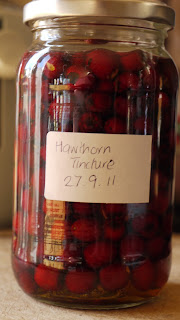Gathering elderberries and Hawthorn berries was the perfect excuse to get out into the wonderful sunshine yesterday. I was gifted with some elderberry cordial a couple of weeks ago, made by my friend Kerry and a handmade gift is always special. So, as I’m stocked up with cordial I decided to make some elixir, one of my favourite ways to take natural medicines, in honey and brandy. Reading one of Kiva Rose’s elderberry posts I realised it could have another benefit to the elixir; Kiva suggests the fruit is more effective when it has not been heated.
 |
| Elderberries |
Documented evidence of medicinal usage of elder goes back to the Romans and there have been a couple of studies looking at the effects of elderberry syrup on the flu virus which shows it is indeed effective. The duration of illness in people with flu was shorter and the immune system was boosted, some writers say this was by increased antibody production. Kiva Rose says it “modulates” the immune system rather than stimulates it so people with auto-immune conditions don’t need to worry about increased activity. It seems to be common practice to take elderberry as a preventative medicine in small daily doses. Be careful, too much elderberry can cause nausea.
To make my elixir was simple, I put the collected berries into a jar and half filled it with honey, gave it a stir, topped it up with brandy and then gave it a good podge with a chop stick to remove any air bubbles. I will leave them about 6 weeks and then strain off the fruit to leave my elixir.
In Hedgerow Medicine by Julie Bruton-Seal and Matthew Seal there is a recipe for elderberry syrup:
Take your ripe elderberries, add half their volume of water and simmer for 20 minutes, then squeeze out the juice. For each 500ml of fluid add 250mg muscovado sugar, a stick of cinnamon, a few cloves and a few slices of lemon. Simmer for 20 minutes and then use for colds, coughs and flu.
 |
| Hawthorn Berries |
Hawthorn’s use as a cardiac medicine dates back to the ancient Greeks and the Native Americans and more recently to an Irish physician, Dr Greene of Ennis who treated heart disease with hawthorn berry tincture.
The cardiac benefits are believed to be allowing blood vessels to dilate so as the heart pumps more effectively, mild angina relief and stabilisation of an irregular heartbeat. It may also soften fatty deposits in blood vessels that can lead to hardening of the arteries or atherosclerosis.
Hawthorn is also calming and some use it for insomnia. Several studies report that hawthorn helps to preserve collagen (the protein that makes up connective tissue), which can become damaged in conditions such as arthritis.
The cardiac effects are thought to be due to the high content flavonoids in the plant, in particular oligomeric procyanidins (OPCs), which strengthen and dilate capillaries, resulting in increased blood flow and oxygen to the heart area, relieving hypertension and pressure.
On the emotional side hawthorn is still a heart healer, helping with emotional pain and being able to open up one’s heart
I made a tincture with brandy; I simply popped the berries into a jam jar and covered them with alcohol where they will infuse for about a month.



Have you already made your hawthorn vinegar - I really like it as a drink and it's a good way of getting hawthorn into people who wouldn't have it any other way.
ReplyDeleteThis is a great post thank you. Fascinating stuff. I'm looking forward to playing with some elder and haw berries myself over the coming weeks!
ReplyDeleteCan Hawthorn berries and elderberries be infused together? I'm trying to make elderberries as my base and mixing other herbs to tailor to each of my family members needs, like diabetes, HBP,etc
ReplyDelete